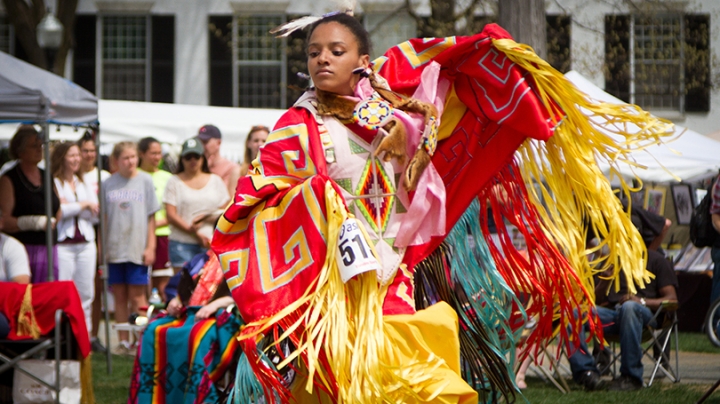Dancing and drumming will once again be the center of attention on the Green May 12 and 13 as Dartmouth’s 2018 powwow is expected to draw about a thousand participants and spectators to the annual celebration of Native American culture.
Grand entry takes place at noon on both Saturday and Sunday. Rain location for both days is Dartmouth’s Leede Arena.
The powwow has been hosted at Dartmouth since 1973 by the student group Native Americans at Dartmouth (NAD) and the College’s Native American Program (NAP). The event enables members of both the Dartmouth and Upper Valley communities to observe, participate, and learn from a broad representation of Native American cultural activities. Some participants also come from across the nation.
“The fact that we’re going on our 46th year really puts into perspective for me how long this institution has been committed to educating indigenous students going back to the 70s under President John Kemeny,” says Evan Barton ’20, who is student co-chair of the powwow organizing committee with Breanna Sheehan ’20.
“A lot of native traditions and practices are about honoring those who have come before us and honoring those around us,” Barton says. “That’s really what the powwow means to me. It is about doing that over a weekend through dance, through traditional artwork, through traditional foods, and through coming together as a community.”
He is a member of the Cherokee Tribe of Northeastern Oklahoma and his co-chair, Sheehan, from Brattleboro, Vt., is Abenaki.
Featured leaders for the 2018 powwow include Master of Ceremonies Larry Yazzie and Arena Director Orrenzo Snyder. White Bull is the host drum. Head man dancer is Marcus Winchester; head woman dancer is Darshina Yazzie ’19; and head person dancer is Sherenté Harris.
This is the second year that the Dartmouth powwow has included a head person dancer.
“The head person identifies as two-spirit, which is a gender identity in a lot of native cultures where they are the embodiment of male and female in the same body. It goes back generations. We did this because it’s an inclusive way to recognize the identity that a lot of people in the 21st century identify with,” Barton says.
Vendors selling traditional Native American food, art, jewelry, clothing, and crafts will be part of the festivities as well.
The powwow is free and open to the public. It is sponsored by NAD, the Office of the President, the Special Programs and Events Committee, the Division of Student Affairs, the Office of Student Life, the Native American Alumni Association of Dartmouth, and NAP.
William Platt can be reached at william.c.platt@dartmouth.edu.


